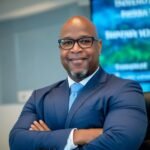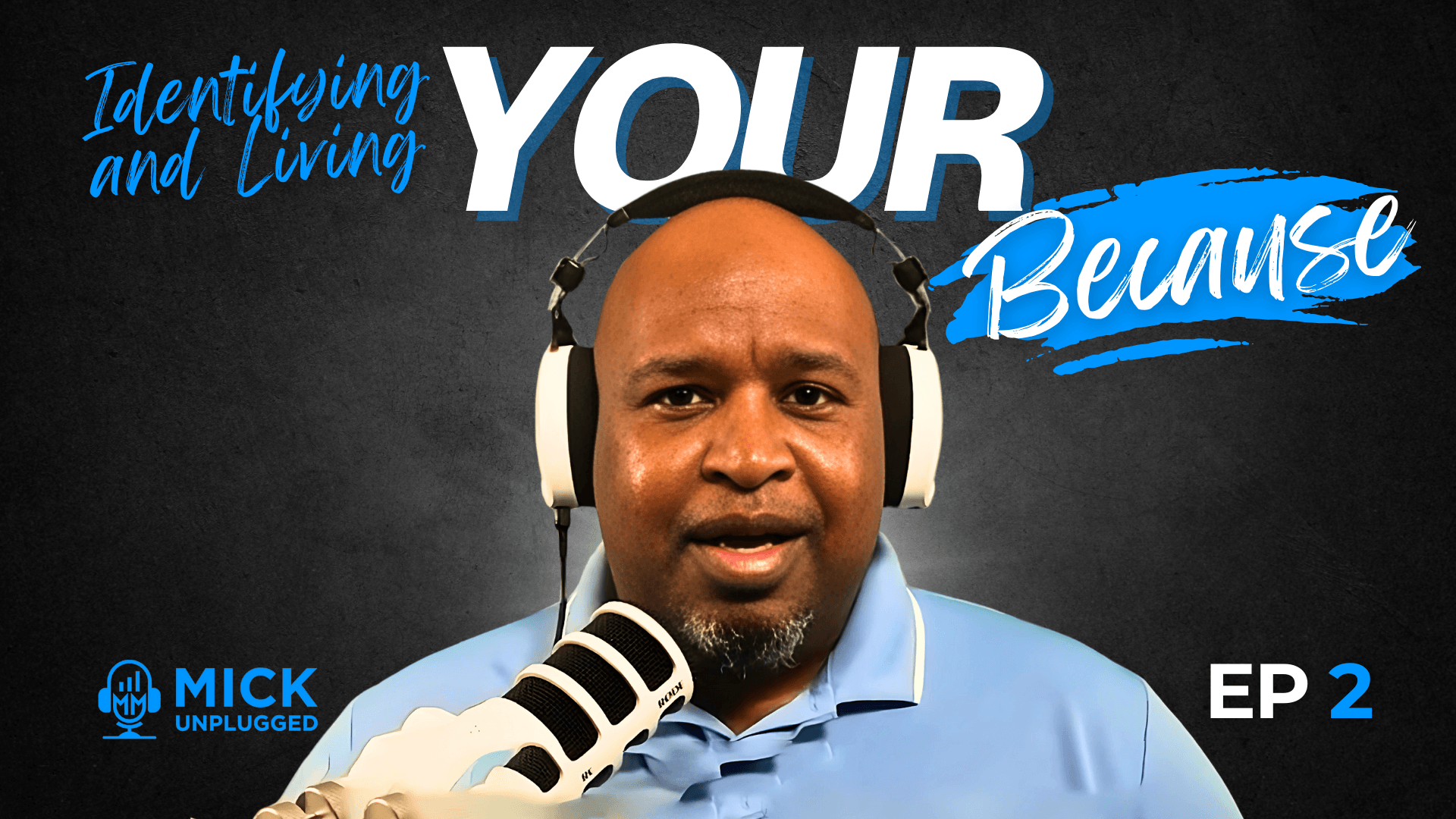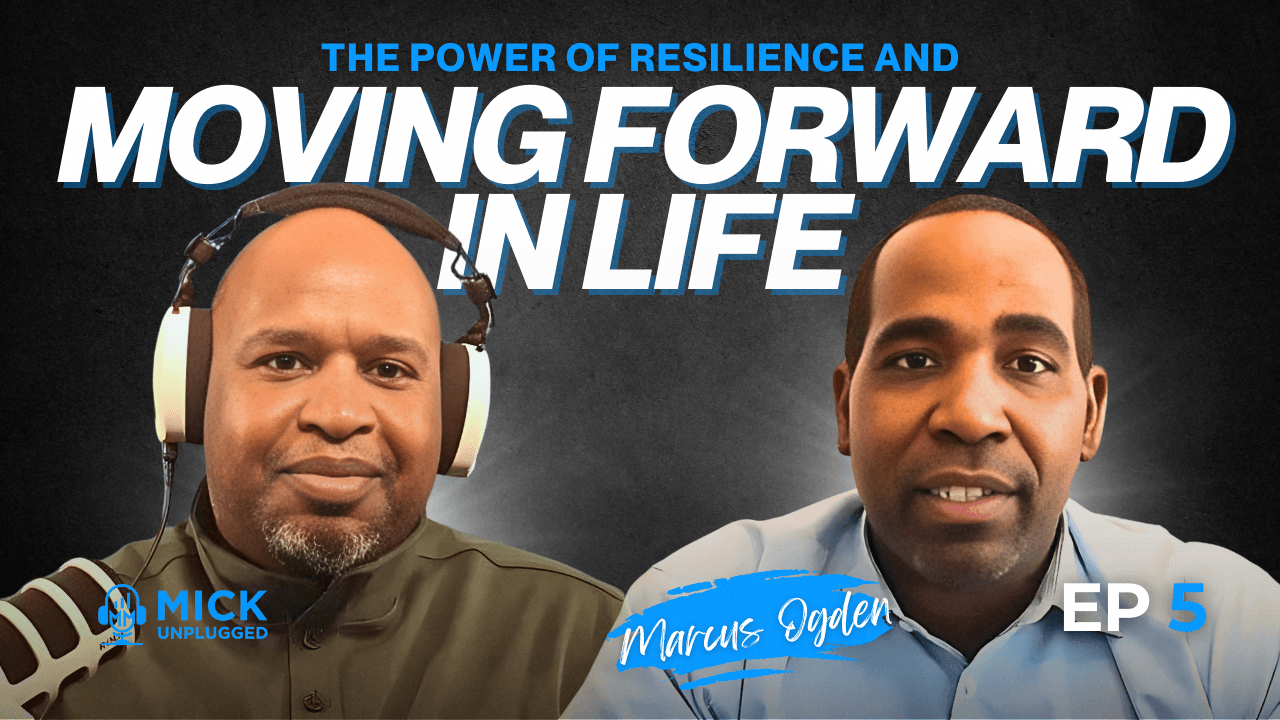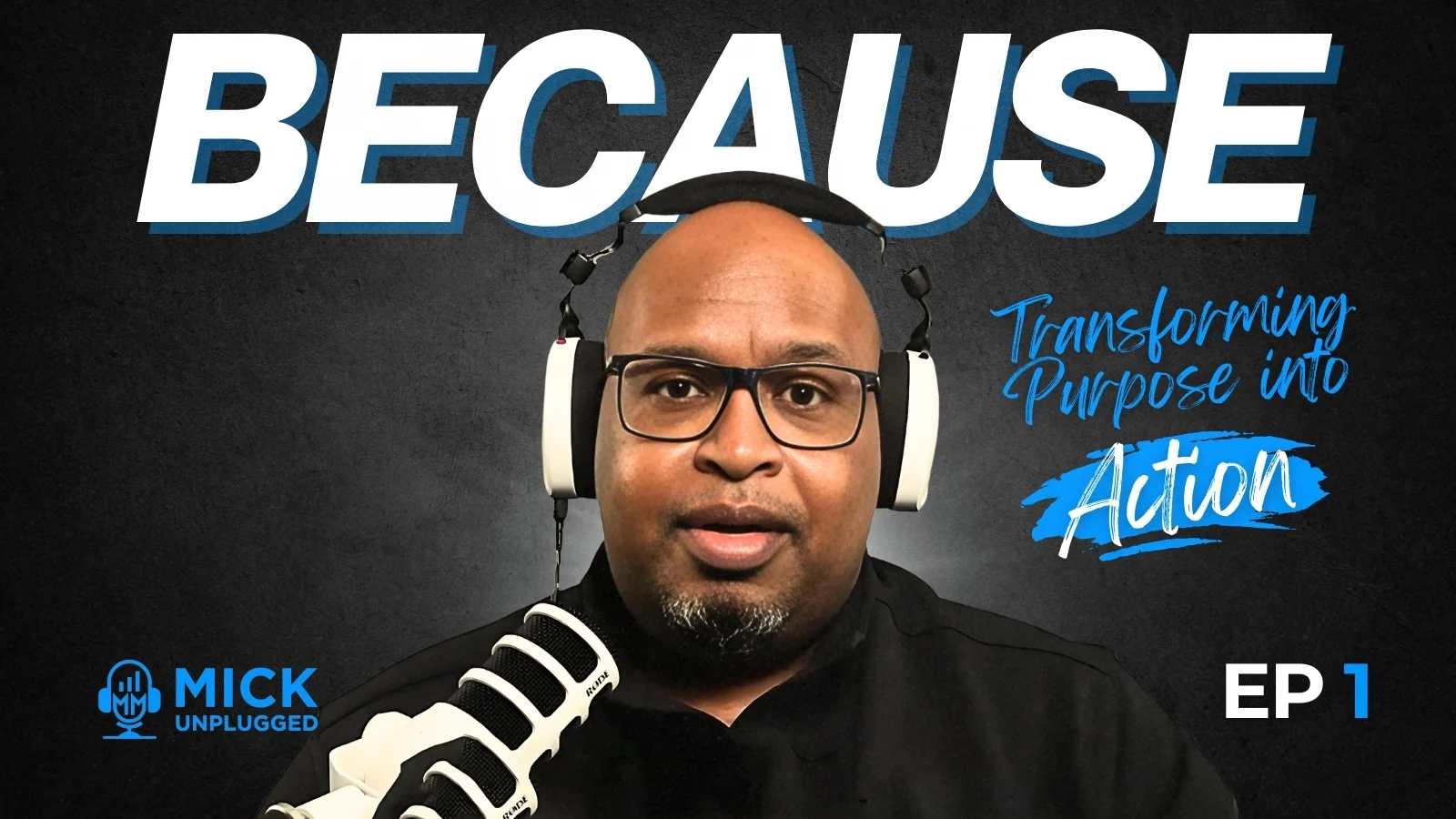[00:00:00] Podcast Intro: Are you ready to change your habits, sculpt your destiny, and light up your path to greatness? Welcome to the epicenter of transformation. This is Mic Unplugged. We’ll help you identify your because, so you can create a routine that’s not just productive, but powerful. You’ll embrace the art of evolution, adapt strategies to stay ahead of the game, and take a step toward the extraordinary.
[00:00:29] So let’s unleash your potential. Now, here’s
[00:00:31] Mick Hunt: Mic. Ladies and gentlemen, welcome to another exciting episode of make them play where we go deep into your because those things and reasons that build you to be the person that you are. And today I have a guest that is truly inspirational. He’s a former sec defensive player of the year from the university of Florida.
[00:00:50] And Former professional basketball player in the NBA and EuroLeague and is now a broadcaster with the SEC Network. More importantly, he’s the author of Sit to Rise and the founder of the P. Y. Four Foundation, which supports individuals facing life altering events. He is a man who’s discovered a new purpose in life and is guiding others.
[00:01:12] Through fighting adversity. It is my distinct honor and pleasure to introduce the man that I used to call the incredible Hulk, Mr. Patrick Young. Patrick, how you doing brother?
[00:01:20] Patric Young: Pretty good. And you know, one thing that I had in common with the incredible Hulk, I used to have a, some anger issues. So it did show up on the court.
[00:01:27] So that’s, that’s, that’s sometimes in practice. So that’s a, that’s pretty accurate, but I’m great to be here. Hopefully I can, I can bring some value, love, you know, every opportunity, however, big or small or whatever it is, you always want to try and leave it better than you left it. So hopefully we can accomplish that today.
[00:01:42] Mick Hunt: You were totally going to do that because I know the man that you are. So I appreciate that more than anything. Let’s talk about your life, your journey, the things that you’re doing now. And I’m going to let this be an open canvas for you because you know how much I respect and adore you wherever you want to take this is where we’re going to go, but ladies and gentlemen, be prepared, be prepared.
[00:02:01] Patrick’s about to give it to you and give it to you raw. The only way he knows how. So Patrick, man, let’s, let’s talk a little bit about your life and how you got to where you are today.
[00:02:10] Patric Young: You know, it’s hard to know where to start, but you know, people always say to start from the beginning. So I’m, I’m from Jacksonville, Florida.
[00:02:16] Born and raised. Both my parents actually grew up here in Jacksonville as well, which is pretty rare. And I love my city. I love my Jaguars. I grew up a Gator fan. Man, I miss the simplicity of life as a kid. I’m in that millennial stage where growing up, we were transitioning into technology. You know, when I say we, I mean my neighborhood friends that I grew up with.
[00:02:36] No, we didn’t need phones. We didn’t, man, we just looked outside, don’t ring the doorbell, call the house phone. Hey, so and so, can they come out and play, you know, and then transitioned into as we were getting older. social media started picking up and whatnot. But I was super, super supportive parents. My parents are still married to this day, actually staying with them right now in this in this season of life.
[00:02:58] Man, I just been so blessed with all the things that I had to help allow me to be in a position that I know a lot of people don’t have and aren’t able to. I definitely took some of those things for granted growing up because you don’t know what you don’t have until you don’t have it sometimes or when you’re not exposed to other people that don’t have the things that you You consider just a thing when it actually is a privilege and a blessing.
[00:03:19] So we grew up, grew up in the church and I’m so thankful for that foundation. Even though I wasn’t, wouldn’t say that I was necessarily like an active follower of Christ. I just had that foundation to know. who he was, a lot of things in which he taught and it really wasn’t until I got out of your parents house and you started to become your own man where you kind of can see a lot of things that you’ve learned were true.
[00:03:40] So I was fortunate enough as an athlete coming here out of Jacksonville to be a McDonald’s All American top player in the country, was able to go to my dream school. The University of Florida with Coach Billy Donovan and, you know, yesterday I talked online with, uh, Coach Buzz Williams and their basketball team as they’re preparing for the summer, preparing for this upcoming season and Coach Buzz gave me just this awesome introduction on all the things that I accomplished and the first thing I want to address to those guys is that almost all those things never happen and you said a few of them.
[00:04:09] Final four, three elite eights, SEC tournament, SEC regular season, first player and only one player ever to win SEC academic player of the year. three years in a row, defensive player of the year, numerous awards that I was able to be a part of. But you know, my freshman year, I just wasn’t able to grasp the difficulties of transition change from high school where you really could just out talent everybody on a given night is 6 ft 9 230 lbs.
[00:04:37] I mean, it’s rare that you’re ever going to run into somebody once or twice in a season that’s going to even affect you or slow you down. So it can affect that work ethic and you understanding how far you and much you need to know and how much you don’t know. So when I got to college, you know, transitioning to being on your own, adjusting, wanting to fit in, wanting to be liked, study hall, practice, scouting, film, weights, all those things.
[00:04:57] It can be overwhelming. And you know, with how difficult all that stuff is, it led to frustration. It led to me just not understanding the process. And seriously, like, and I mentioned this in the book, Coach Donovan had to take me to his office a little bit before the season started, I believe, and said, Hey, man.
[00:05:14] I love you, but if you’re not gonna let me coach you, you might as well think about transferring somewhere else. I’m thankful for that because he wasn’t asking for perfection, never was, but he was asking for humility. He was asking for progress, not perfection. And, you know, I was, I was not perfect through that, but I did progress.
[00:05:30] Each year I got better with my attitude, with my understanding, with my love for the game, with my role. So grateful. I stayed on for years. I didn’t end up getting active, but I was fast enough to get an opportunity with the New Orleans Pelicans and play with them as a quick stand. I was there with Manny Williams, a man that I really do look up to and admire Anthony Davis, Jemma for dad, Tyreek Evans, Drew Holliday, just a whole group of guys that were such great basketball players.
[00:05:56] I ended up getting cut and I ended up going overseas. That was a tough decision to make. Do I stay in America and try and go the G league route where I can be a lot more readily available to an NBA team. If they want to sign me, you make peanuts. And when I say peanuts, I mean, you’re lucky if you make 20, 000 on the year and you’re living in really tough cities or go overseas, make some real money, and then you can come back and quote unquote struggle later with the money in your pocket.
[00:06:21] So I went over and I went to Turkey, my first spot in. You know, one thing that I just love about my first season over in Turkey, my love for the game came back, but it’s tough. You know, you go from being a key component to a Final Four team to the 15th guy on an NBA team, not playing, barely practicing, barely getting reps in, trying to stay ready.
[00:06:39] And then I go overseas and I became that guy again. You know, long story short of my career, I played Turkey one year, Greece for two years, two years in Italy and one year in Israel and ended up hanging up my shoes. With basketball pretty much the end of 2020, going into 2021. And I just was ready for life change, ready to see what else God had in store for my life.
[00:06:59] And when you’re playing ball overseas, you’re over there for 10 months. So I want, I wanted to make up and, you know, recreate and make new memories with the people that I loved and the holidays and just see what came in store. And, you know, that year in 2021, I got engaged. I started working with the SEC network and, uh, auditioned with them and got the job.
[00:07:16] And then I was. Working with another company part time. That was a great opportunity. So I come into that year and I’m like, man, life is good. You know, life is good. Life is great. God is good guys. Open doors. I got engaged December 4th, June 29th, which we’re actually coming up on was going to be the day where everything was kind of changed for me.
[00:07:33] When I got in a car accident that changed my life and left me paralyzed from the waist down. And yeah, I’ll pause there so you can, you know, go where you want from there. Cause there’s so much, I can be, I can tell the whole thing at once, but I don’t want it to be a monologue.
[00:07:44] Mick Hunt: No, man, I wanted to give you the platform, number one, because you deserve it.
[00:07:49] But you hit on a lot of things that resonate with me personally. And, you know, talking about being coachable. Billy Donovan just wanted you to be coachable. And I think a lot of people miss that aspect, not just in sports, but in life in general. When you feel like you’re that guy or you’re that gal and no one can teach you or tell you anything, that’s usually when things are the worst for you.
[00:08:15] Right. And I love that you said you didn’t have to be perfect. You just had to show up. You had to be available. But most importantly, you had to want to be coachable because a lot of people will say, okay, I’m coachable until you start coaching them. Right? Right. It’s I’d love for you to talk just a moment about for you.
[00:08:33] What does being coachable mean?
[00:08:35] Patric Young: Well, I think what happens so often times and not, you know, I know what happens in my case and I know what can happen in other people’s for me. I did struggle with being a little bit coachable before coming into college, especially with my dad. I don’t know why it is, you know, why is it with kids and parents that were so resistant on what they want to tell us and teach us.
[00:08:53] But fortunately, when I transferred to Providence, another school here in Jacksonville, that was the first coach to get on me and push me. And I understood he loved me and he wanted me there. That’s why he was getting on me. He saw the greatness within me. And, you know, I’m fortunate that I didn’t have social media at the time to where it is now.
[00:09:11] Because there’s so many people that are telling you how great you are, how good you can be, this and that, and whatever. But the thing is, that’s, that’s an expectation that is external. Versus having this internal standard that says, okay, I appreciate what people are expecting and think and believe that I can be.
[00:09:27] But I understand there is a large amount of work required for me to get to where I want to get to. Potential is only potential until it actually becomes that pinnacle. I didn’t realize that. You know, I was frustrated because I thought it was going to be easier. I I thought that, you know, when I came to college that I was still going to be able to out talent people and that the amount of work that was required was way more than I was, I had ever worked, I mean, I had never worked as hard as what I believe is required for you, like, I don’t want to say you have to be obsessed, but it has to be a priority.
[00:09:58] It has to be, you know, there’s this book that I, I haven’t read it yet, but I want to, it’s the um, The Cost of These Dreams. And it just has so many stories of athletes like Jordan, all of these sacrifice in order to get to where they wanted to get to, because that’s what it requires. It requires sacrifice.
[00:10:14] There is a cost that is due every single day. And there’s not only that, but you know, my AAU coach, he’s been coaching, I mean, well over 30 years, he and I were catching up and talking about three different generations of how he’s had to change his coaching 30 years ago, 35 years ago. He could really get on guys and sometimes you grab them by their jersey, just knock them inside the head.
[00:10:35] And eventually it was like, okay, that might be a little too much, right? Child abuse, et cetera. Like we look at that now as it’s wrong, you shouldn’t, obviously you shouldn’t have to hit somebody as an almost adult in order for them to get something. But I get it. I get the frustration that coaches can go through sometimes.
[00:10:50] Then you go, you know, you can’t hit players, next generation, my generation, but you can, you can cut them out. You can say, you can cut them out from A to Z and sometimes your feelings might get hurt for sure, but you bounce back, you bounce back. You can understand that it’s about the message, not the tone.
[00:11:06] And he says, now in this current generation, you can barely say anything. It’s a group that is so connected to their phone and not able to emotionally understand what is being delivered to them is not, it might be criticism. You know, and I think that might be the reason that that wording like people struggle, but it is correction.
[00:11:24] It is, there’s blind spots. There’s things you don’t know about the game and this coach wants you to succeed, but you have to understand by you not doing the things that are required or asked of you, you’re hurting the team or you’re not going to get on the court. If you can’t remember plays, if you can’t do the basic things that they’re asking you, how can you expect that they’re going to put you and give you a time over a starter?
[00:11:45] And yeah, to your point in life. You know, I don’t think that we, as individuals, we haven’t normalized asking for feedback, whether it’s your wife, your child, your boss, your friend. So when someone does criticize us, justified or not, right or wrong, take the offense. Like, how dare they say that? You know, and I realized a pastor friend of mine said the word offense, I think trans, I can’t remember if it was translated in Greek or Hebrew, but.
[00:12:11] It translated over to bait that you don’t have to take the bait. Yeah, someone can say something offensive, but you don’t have to pick it up and be offended and carry that thing around with you. That’s kind of where I’ve been trying to put myself in that space moving forward. It was so easy for me to get offended before I started growing up and understanding that coaching and correction is coming from a loving place.
[00:12:33] From the people in my life. So, um, yeah, that’s a that’s a great question.
[00:12:37] Mick Hunt: That’s awesome. I love your response to that. And then I want to talk not necessarily about the accident, but how you’ve transformed your life since because be as honest and transparent as we can. Right? Like, yeah, for sure. It’s very unfathomable.
[00:12:53] Right? Like, yeah. You’ve gone through things that people can’t imagine unless you’ve been there. And so I never want to minimize that at all. So the transformation of what has that been like?
[00:13:07] Patric Young: You know, I think it’s important at least to touch on, you know, just, you know, the car I had the car accident. It was June 29th.
[00:13:13] Had to get life flight again to South Dakota. No one died. It was just me had an eight and a half hour surgery for the doctor. Put in two rods, 12 screws and being told your chance of walking again. You know, it’s slim, not impossible, but slim and then going on to rehab and face the identity crisis that I, you know, anybody would go through.
[00:13:34] I told the men yesterday that, hey, if you would have asked me before the accident, How I would have defined manhood. I wouldn’t have said about how much weight you can lift and just kind of how the world defines a man. Things, success, provider, not provider of protection, not provider of love or support. I would have said, yeah, I agree with that, but it wasn’t until truly it was stripped away.
[00:13:56] A lot of things that I attached myself to, where I had to say, all right, well, God said, all right, who are you now? Basketball’s gone. You’re not standing towering at your height that you, uh, you’ve been your whole life. Six foot nine. You can’t dunk. You can’t lift weights. You can’t squat. And you can’t run.
[00:14:11] You can’t, who do you believe you are now? You can’t dance with your wife. You can’t, you know, mess, mess around and wrestle with your daughter and play with her. And, and you know, the stuff that I would have loved to do with, with my daughter. And it is so easy to focus on the things you can’t do and to become bitter about it.
[00:14:28] But for me, I felt many of things that I owed it to my family, to my wife, to my dog, squeeze out and discover and find who Patrick Young really is. And then also with God, I said, you know what? In James 1, 2 through 3, it says to consider a pure joy in the face of trials of various kinds. You know that enduring in your faith creates perseverance, and when that perseverance completes, you will become complete, lacking in nothing.
[00:14:51] And I said, you know what? It’s inevitable. It’s diverse that I was going to face something in life. We all are. And God said this is an opportunity for pure joy, so I’m going to put that to the test. If you said joy is found, but you know, for people that might not be religious, listen to this. How many things have you gone through in your life that you didn’t want to, that were uncomfortable, that challenged you?
[00:15:08] It doesn’t have to be anything anywhere close to as big as what I’ve gone through and still going through. You endured it, you got through it, whatever. And you’re like, dang, I’m kind of glad that happened or that thing helped me become more patient. That thing helped me change my perspective. And just in this short time coming up on two years, of course, I battled with why this isn’t fair.
[00:15:28] But when you are able to see the goodness that comes from it and how it affects other people’s lives, like, look, it’s not about perfection again in this, but I progressed. Sometimes I know the littlest thing of just showing up. People seeing me show up in places and going and standing and not faking it.
[00:15:44] I must almost say fake it till you make it. But having this realization and this acceptance that life is now, life is now, yes. I would love to go back and change. I love to do high school again. I love to do childhood again. I can’t do them. So nothing has taken away my decision making. Our life is full of choices, full of choices.
[00:16:01] And I’m not going to say it’s easy. And there’s people that have things a lot far worse off than I do. That’s something that keeps my mind sober. I’m that there’s people that are suffering far greater than I am. And there’s not only the calling and my purpose, this pit. And I heard who said this the other day.
[00:16:17] It was my therapist. He was like, man, the pit that you’re in doesn’t stop your purpose. The pit doesn’t doesn’t change your purpose. It might delay. It might slow you down, but you’re not gonna be in there forever. Joseph was in a pit for a while, and I mean, you would have thought he was gonna be done for.
[00:16:32] But his purpose and the calling and the vision that he had not and I have a vision that I’m going to squeeze out every ounce of potential and chase after first off like this has made me a person, the man and what I’m going through that I wish I always would have been because I think a lot of people like me and athletes that have been exposed to this kind of narcissistic idolization, you’re the athlete, you’re the star, you get free passes just because of this and that.
[00:16:58] It makes you believe that you’re better than you are, and you’re more important than you actually are. And, I mean, it’s just filling up your bucket of pride. And a lot of athletes, myself included, Oh, I’ll get to that one day. When I stop, I’ll stop, I’ll stop sleeping around. I’ll stop doing this or that one day.
[00:17:13] And when is that one day? When is that one day? Because tomorrow isn’t guaranteed, and, you know, this situation that I’m in forced me to be bitter and mad, angry, and nobody would fault me for that. Nobody would fault me for being the opposite space that I’m in now. And I said, you know what? No, I am going to maximize this and use what I’ve been given to become the man that I know I’ve been called to be.
[00:17:35] And there’s still areas, you know, Where we all need to prove, improve, you know, I know we all know it, but just the exponential growth on a personal level I’ve had has been been insane. It’s been amazing.
[00:17:45] Mick Hunt: I love that, man. And, you know, following you and seeing a lot of the things that you’re doing on social and then, you know, whatever I can see out on these internets out here.
[00:17:55] One of the things that I truly love. And you don’t necessarily say it in these words, but it’s something that one of my accountability partners, Karl Lester Crumpler talks about all the time. It’s people talk about being happy, but what about joy and fulfillment? When you live your day, are you really getting joy and fulfillment out of it?
[00:18:15] Because to me, that’s what matters the most. And every time I hear you talk, every time I see a post, I say, Patrick is making sure that before he puts head on pillow. He is fulfilling his mission of the day. Am I on? Yeah,
[00:18:30] Patric Young: I think you’re on. Oh, you know, now I punched you out again, but yeah, you’re dead on with that happiness versus joy.
[00:18:36] I just chasing happy is something I just, I don’t do. There’s moments. I think we know as individuals what things we can do that will fill our tank up, hanging around other people, quiet time, watching sports, whatever that may be. But those things are all circumstantial. Those things are all, I have to do something in order to get to that thing.
[00:18:58] And, you know, for me, one thing is like, you know, I’m currently in a season where I’m not fully independent as I was before. Not yet. So I still have to get, let’s say on average, two to four hours of care at home, morning and night. And that doesn’t make me happy at all. Not even a little bit. Just having to kind of be prisoner, it can feel that way to the circumstance.
[00:19:18] But I said, you know what? When you can change your perspective, and I think, gosh, if my mom wasn’t a nurse, my dad’s not a nurse. Yeah, he’s stepping up into this. I have great, we have fantastic insurance. Like this is not, I’m able to just change my mind to a place of gratitude. And I won’t say it’s like the ultimate level of joy, but there’s joy in like, you know what, things will be worse.
[00:19:39] I’m taking care of, like I’m not in the hospital. I’m able to still do things. I’m able to still there’s joy in that for me, you know, with joy, going back to that scripture, it’s, it’s an opportunity for joy. So it’s a changing of your mind and saying, man, this sucks. But God says there’s an opportunity here.
[00:19:57] I think it’s important to allow ourselves to acknowledge and have the self awareness of where we are emotionally. If we’re sad, if we’re angry, we can go from that point, that starting destination to get to where we want to get to. And yeah, there’s annoyance for me, there’s sadness, there’s this anxiety of, I just want to, I’m missing out.
[00:20:15] And I said, you know what? My parents are caring for me and someone shared this with me on average, once your kids leave the house at 18 on average for the rest of their lives in your life, you spend two years total with them, you know, accumulating and I’m getting this period of my life right now where when I got out of the hospital October 4th, I’ve been with my parents since then.
[00:20:35] And as long as as an adult, obviously I’ve been with them and I’m like, you know what? Instead of having this mindset, Oh, I can’t wait to get out of my parents house. Then I’m going to do that. Let me enjoy it. Being able to kind of slow down, simplify has been so fruitful, man. It’s been so, so fruitful. I can’t even put enough justice to that.
[00:20:54] Mick Hunt: That’s awesome, my brother. So let’s talk about the PY4 foundation, man. Like, what are you doing with the foundation? What’s the purpose? And then more importantly, I want to know how can the listeners and the viewers and myself, how can we support. and be a part of this foundation with you.
[00:21:08] Patric Young: So taking a step back, like I think from the outside in outside looking in, people might think, Oh, Patrick Young just started.
[00:21:16] It was one of those things for me. One day I wanted to write a book. One day I wanted to start a foundation. One day, one day, one day. I didn’t know what the message was going to be. I didn’t know what any of the things were going to be. And I was kind of just like, ah, you know, it’ll come to me one day. And you know, I don’t want to say thank you for the accident for me to be able to have the clarity, but thank you for the accident.
[00:21:36] Giving me clarity to a space, as you said, when you started this podcast that it’s a space that you don’t know unless you’re in it. I knew nothing about spinal cord injuries before this, nothing before my accident and how it affects people. The person, their family, their kids, their job and all. And I was like, you know what, there’s got to be a way to help as many people that are going through this that don’t have the support that I do.
[00:21:59] And we can raise money to meet some needs. You know, we just recently I gave 25, 000 for the purchase of a vehicle to a hospital here that needed a new vehicle. You know, they went off of grants, but a vehicle was like It wasn’t anywhere high on the totem pole because there’s so many other things that they need to do to care for the patients and this vehicle is going to hopefully for the next 15 years help each year two to three hundred people learn how to drive again that have had an injury.
[00:22:24] So people might wonder, how do I drive? This right here is my hand control. When I push it forward, it brakes and when I turn this knob down, that’s how I accelerate. You can see I have a lift in the back of my, of my, my truck that brings my wheelchair to me. Wow. That’s pretty awesome. Isn’t that a blessing?
[00:22:41] It allows me to drive my truck and have the freedom. And I’m like, I want other people to have the opportunity to experience something like this. You know, I guess, you know, with support to the foundation, you know, certain things that you can do in your personal life. When you see people in a wheelchair in general, you know, I think it doesn’t take much to be kind and see that person and acknowledge them and the same way that you will with anybody else.
[00:23:04] Cause I just know the struggles that a lot of people have in a wheelchair when it comes to self esteem and self confidence and feeling invisible, feeling like they’re overlooked. And that’s something again, that’s something free. I’m not asking anybody for money, but just awareness and intentionality there.
[00:23:18] You know, with us this month coming up on June 29th, it’ll be the two year anniversary of my car accident that we just are trying to raise 10, 000. I came up with the idea of it like the last week of May to just offer my speaking services and whatever else anybody may want for free. Just a donation of any amount to the foundation to hit that number and we’re almost there.
[00:23:39] I mean, three days away and shoot golf tournaments in September, if anyone wants to fly into Jacksonville and be a part of the golf tournament, we got a third year doing it and super excited. But, you know, there’s so much to the story and I hope that anyone that can listen to this gets a chance to read my book.
[00:23:53] I go into a lot more depth and a lot of things I’ve learned and experience I’ve had that I think will affect and touch your life.
[00:24:01] Mick Hunt: So a couple of things and I’ll get you out of here. So where can people follow you and find you on these internets?
[00:24:06] Patric Young: The first one is easy. It’s my name on Instagram and on Twitter and my social media and my website.
[00:24:12] So my name is Patrick Young without the letter K. So P A T R I C Y L U N G and the letter four at the end for the website. There’s no four. And for the foundation, it’s just P Y the number four, foundation. com. So, I mean, I’m, I’m pretty active on there, so it’s not hard to find me. I try to do as much as I can for every post that I make for every thing that I do on there for it to be something positive and uplifting and anybody that wants to reach out, whether it’s just to talk about this, they have questions about things you’re dealing with.
[00:24:40] Nobody is too small for me at all to call or talk to or anything. I don’t believe in that. So reach out in any way possible that you may want to do that.
[00:24:49] Mick Hunt: Absolutely. I’m going to put links to all of your platforms in the show notes and comments section of this for the viewers. I’m also going to put a link to the book.
[00:24:59] I need everybody to go get the book Like, as a matter of fact, I am going to buy copies myself and make available for people as well, too, because
[00:25:07] Patric Young: I can mail you some fine ones. You just let me know.
[00:25:10] Mick Hunt: We will do that for some listeners. You’re going to get a signed copy of Patrick’s book, and I don’t want you to give them to me, Patrick.
[00:25:18] I want to, I want to buy and support the foundation as well, too. And then also Patrick, you do. Public speaking as well with what is his players to
[00:25:27] Patric Young: good. Yeah, I just started working with Rose and she’s been awesome. Just trying to get my name out there and story out there. What I love so much about the foundation about her organization.
[00:25:37] It’s not just people coming up there and speaking just to speak. The clientele she has, I’m really trying to make a difference in this world and impact people’s lives. And, you know, I’m honored to be a part of her team. Opening up some opportunities and working on my behalf. So I just, they’re really cool working with her and you know, anybody that wants to as a company or something that needs someone to speak virtual in person, it really doesn’t matter.
[00:26:00] We’ll make that happen.
[00:26:01] Mick Hunt: Players for good. Everybody remember that I’ll have a link to that as well so that we can get more goodness out of Patrick, because trust me, as soon as you start following, you’re going to see what I mean. If you’re not following them now, you’re going to see what I mean. But all of the socials players for good.
[00:26:15] We’re going to make sure that we have all of that there, Patrick, man. I appreciate you taking time out of your busy, crazy schedule. It means the world to me to have you on. Even though I’m not a Gator, you know, I’m a Tar Heel, but I support the good. And you’re fortunate.
[00:26:30] Patric Young: We never played y’all when I was, I was there.
[00:26:32] We never played Duke or North Carolina for some reason. I think, I think y’all were scared. So.
[00:26:37] Mick Hunt: No, y’all to beat the heck out of Duke, y’all to have problems with us though, y’all, y’all for all the listeners. Remember your because is your superpower. Thanks
[00:26:47] Podcast Outro: for listening to Mick unplug. We hope this episode helps you take the next step toward the extraordinary and launches a revolution in your life.
[00:26:56] Don’t forget to rate and review the podcast and be sure to check us out on YouTube at Mick unplugged. Remember, stay empowered, stay inspired, and stay unplugged.






